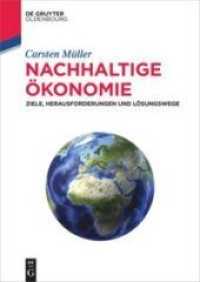- ホーム
- > 洋書
- > 英文書
- > Philosophy
Full Description
This book argues that a radical political gesture can be found in Søren Kierkegaard's writings. The chapters navigate an interdisciplinary landscape by placing Kierkegaard's passionate thought in conversation with the writings of Georg Lukács, Carl Schmitt, Walter Benjamin and Theodor Adorno. At the heart of the book's argument is the concept of "indirect politics," which names a negative space between methods, concepts, and intellectual acts in the work of Kierkegaard, as well as marking the dynamic relations between Kierkegaard and the aforementioned thinkers. Kierkegaard's indirect politics is a set of masks that displaces identities from one field to the next: theology masks politics; law masks theology; political theory masks philosophy; and psychology masks literary approaches to truth. As reflected in Lukács, Schmitt, Benjamin, and Adorno, this book examines how Kierkegaard's indirect politics sets into relief three significant motifs: intellectual non-conformism, indirect communication in and through ambiguous identities, and negative dialectics.
Contents
Acknowledgements
List of Abbreviations
Editorial Foreword
Preface by George Pattison
Introduction
One: Crossroads of Revolution and Reaction
Two: Inwardness as an Expression for Revolutionary Praxis (Georg Lukács)
Three: Zones of Exception (Carl Schmitt)
Four: Loafers of History (Walter Benjamin)
Five: Out of the Petrified Primordial Landscape (Theodor Adorno)
Conclusion
Notes
Bibliography
About the Author
Index







